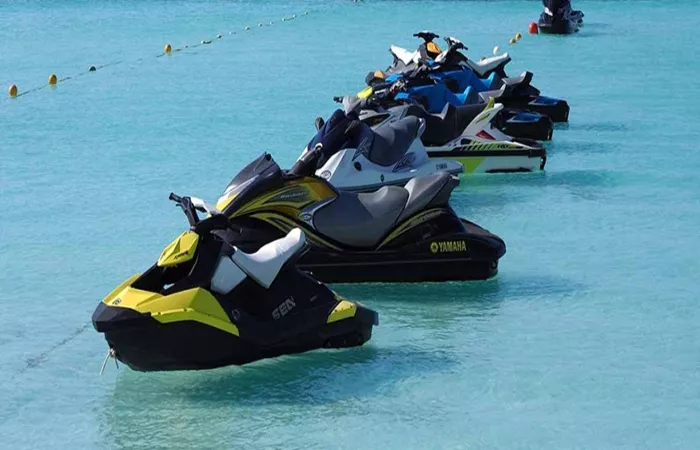Goa, a coastal paradise in India, is renowned for its beautiful beaches and exciting water sports. From thrilling jet – skiing adventures to serene kayaking experiences, water sports are a major draw for tourists. However, the closure of these activities is not uncommon. Understanding when water sports are closed in Goa is crucial for travelers who plan to indulge in these aquatic adventures.
The Impact of the Monsoon Season
Monsoon – Related Hazards
The monsoon season in Goa, which typically spans from June to September, brings heavy rainfall and rough seas. During this time, the water becomes extremely choppy, with strong waves and unpredictable currents. These conditions pose a significant threat to the safety of water sports enthusiasts. Jet – skis and boats can be easily overturned by the powerful waves, and swimmers or kayakers may be swept away by the strong currents. For example, in 2018, several water sports operators in Goa had to suspend their activities due to a series of accidents during the monsoon. A group of tourists on a jet – ski ride were caught in a sudden strong wave, and the jet – ski capsized, injuring some of them.
Safety Concerns
The safety of participants is the primary reason for closing water sports during the monsoon. The rough waters make it difficult for even experienced athletes to control their equipment. Additionally, the reduced visibility due to heavy rain and murky water further increases the risk. Rescue operations in such conditions become extremely challenging. Water sports operators are legally and morally bound to ensure the well – being of their customers. Therefore, they follow strict guidelines and often close their operations during the monsoon months to prevent any potential accidents.
Impact of Cyclones and Severe Weather Conditions
Cyclone – Induced Closures
Goa is also prone to cyclones, especially during the post – monsoon period from October to December. When a cyclone approaches, the local authorities issue warnings, and water sports are immediately halted. Cyclones bring extremely strong winds, which can create massive waves in the sea. These waves can be several meters high and are capable of causing extensive damage to water sports equipment and endangering the lives of those involved. In 2019, Cyclone Vayu forced the closure of all water sports activities in Goa for nearly a week. The high – velocity winds created waves that were too dangerous for any water – based activities.
Other Severe Weather Events
Even outside the cyclone season, other severe weather events can lead to the closure of water sports. Thunderstorms, for instance, can bring lightning, which is a major hazard for those in the water. Lightning can strike the water, and since water is a good conductor of electricity, it can electrocute anyone in the vicinity. Sudden squalls, which are short – lived but intense wind gusts, can also make the water surface rough and dangerous for water sports.
Regulatory and Operational Decisions
Local Government Regulations
The local government in Goa plays a significant role in determining when water sports are closed. They monitor weather forecasts and sea conditions closely. When the conditions are deemed unsafe, they issue orders to water sports operators to cease their activities. These regulations are in place to protect the public. For example, after a series of drowning incidents during the monsoon in previous years, the government made it mandatory for all water sports operators to close during the peak monsoon months. Failure to comply can result in hefty fines and the revocation of their operating licenses.
Operator – Level Decisions
Water sports operators also make their own decisions based on the condition of their equipment and the safety of their staff. If their boats or jet – skis require maintenance or if they do not have enough trained staff to handle the challenging conditions, they may choose to close temporarily. Additionally, if there is a lack of demand for water sports during certain times, such as during the off – season or when the weather is not ideal, operators may decide to shut down to cut costs.
Case Studies of Water Sports Closures
The 2020 Monsoon Closure
In 2020, due to the severity of the monsoon, water sports in Goa were closed for the entire monsoon season. The heavy rainfall and rough seas made it impossible to conduct any water – based activities safely. This closure had a significant impact on the local economy, as water sports are a major source of income for many businesses. However, it also prevented numerous potential accidents, as the sea conditions were some of the worst in recent years.
Cyclone – Related Closures in 2022
In 2022, Cyclone Asani hit the western coast of India, affecting Goa. As soon as the cyclone was predicted, all water sports were closed. The local government and water sports operators worked together to ensure the safety of tourists and staff. Boats were secured, and equipment was stored away. This proactive approach helped to minimize damage to property and prevent any loss of life related to water sports during the cyclone.
Conclusion
Water sports in Goa are closed mainly due to the monsoon season, cyclones, and other severe weather conditions. The safety of participants is the top priority, and both the local government and water sports operators take necessary steps to ensure that no one is put at risk. While these closures may disappoint tourists looking for aquatic adventures, they are essential for preventing accidents and protecting lives. Travelers planning to engage in water sports in Goa should always check the local weather conditions and the status of water sports activities before their trip. By being aware of when water sports are closed, they can plan their vacations accordingly and still enjoy the many other attractions that Goa has to offer.
Related topics:
What Are Three Reasons Why Water Is Important?
What Should I Wear Jet Skiing?
Are Water Sports Popular in India?

